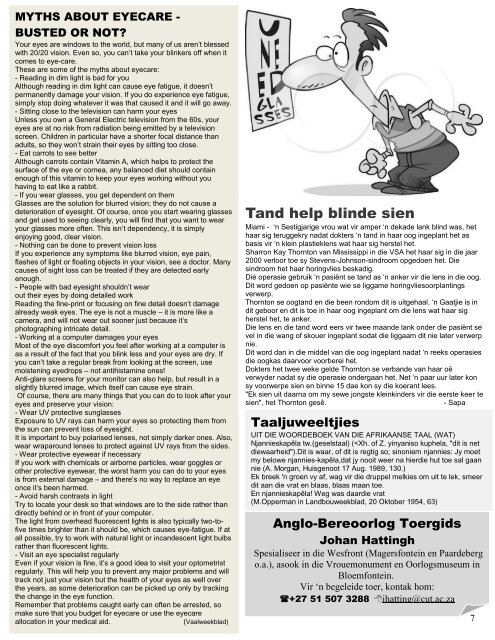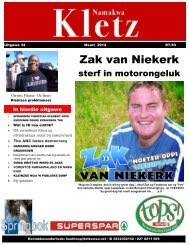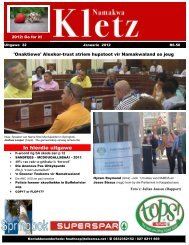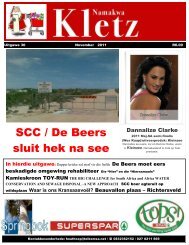Superspar Springbok - Nuwe dimensies
Superspar Springbok - Nuwe dimensies
Superspar Springbok - Nuwe dimensies
Create successful ePaper yourself
Turn your PDF publications into a flip-book with our unique Google optimized e-Paper software.
MYTHS ABOUT EYECARE -<br />
BUSTED OR NOT?<br />
Your eyes are windows to the world, but many of us aren‘t blessed<br />
with 20/20 vision. Even so, you can‘t take your blinkers off when it<br />
comes to eye-care.<br />
These are some of the myths about eyecare:<br />
- Reading in dim light is bad for you<br />
Although reading in dim light can cause eye fatigue, it doesn‘t<br />
permanently damage your vision. If you do experience eye fatigue,<br />
simply stop doing whatever it was that caused it and it will go away.<br />
- Sitting close to the television can harm your eyes<br />
Unless you own a General Electric television from the 60s, your<br />
eyes are at no risk from radiation being emitted by a television<br />
screen. Children in particular have a shorter focal distance than<br />
adults, so they won‘t strain their eyes by sitting too close.<br />
- Eat carrots to see better<br />
Although carrots contain Vitamin A, which helps to protect the<br />
surface of the eye or cornea, any balanced diet should contain<br />
enough of this vitamin to keep your eyes working without you<br />
having to eat like a rabbit.<br />
- If you wear glasses, you get dependent on them<br />
Glasses are the solution for blurred vision; they do not cause a<br />
deterioration of eyesight. Of course, once you start wearing glasses<br />
and get used to seeing clearly, you will find that you want to wear<br />
your glasses more often. This isn‘t dependency, it is simply<br />
enjoying good, clear vision.<br />
- Nothing can be done to prevent vision loss<br />
If you experience any symptoms like blurred vision, eye pain,<br />
flashes of light or floating objects in your vision, see a doctor. Many<br />
causes of sight loss can be treated if they are detected early<br />
enough.<br />
- People with bad eyesight shouldn‘t wear<br />
out their eyes by doing detailed work<br />
Reading the fine-print or focusing on fine detail doesn‘t damage<br />
already weak eyes. The eye is not a muscle – it is more like a<br />
camera, and will not wear out sooner just because it‘s<br />
photographing intricate detail.<br />
- Working at a computer damages your eyes<br />
Most of the eye discomfort you feel after working at a computer is<br />
as a result of the fact that you blink less and your eyes are dry. If<br />
you can‘t take a regular break from looking at the screen, use<br />
moistening eyedrops – not antihistamine ones!<br />
Anti-glare screens for your monitor can also help, but result in a<br />
slightly blurred image, which itself can cause eye strain.<br />
Of course, there are many things that you can do to look after your<br />
eyes and preserve your vision:<br />
- Wear UV protective sunglasses<br />
Exposure to UV rays can harm your eyes so protecting them from<br />
the sun can prevent loss of eyesight.<br />
It is important to buy polarised lenses, not simply darker ones. Also,<br />
wear wraparound lenses to protect against UV rays from the sides.<br />
- Wear protective eyewear if necessary<br />
If you work with chemicals or airborne particles, wear goggles or<br />
other protective eyewear, the worst harm you can do to your eyes<br />
is from external damage – and there‘s no way to replace an eye<br />
once it‘s been harmed.<br />
- Avoid harsh contrasts in light<br />
Try to locate your desk so that windows are to the side rather than<br />
directly behind or in front of your computer.<br />
The light from overhead fluorescent lights is also typically two-tofive<br />
times brighter than it should be, which causes eye-fatigue. If at<br />
all possible, try to work with natural light or incandescent light bulbs<br />
rather than fluorescent lights.<br />
- Visit an eye specialist regularly<br />
Even if your vision is fine, it‘s a good idea to visit your optometrist<br />
regularly. This will help you to prevent any major problems and will<br />
track not just your vision but the health of your eyes as well over<br />
the years, as some deterioration can be picked up only by tracking<br />
the change in the eye function.<br />
Remember that problems caught early can often be arrested, so<br />
make sure that you budget for eyecare or use the eyecare<br />
allocation in your medical aid. (Vaalweekblad)<br />
Tand help blinde sien<br />
Miami - ‗n Sestigjarige vrou wat vir amper ‗n dekade lank blind was, het<br />
haar sig teruggekry nadat dokters ‗n tand in haar oog ingeplant het as<br />
basis vir ‗n klein plastieklens wat haar sig herstel het.<br />
Sharron Kay Thornton van Mississippi in die VSA het haar sig in die jaar<br />
2000 verloor toe sy Stevens-Johnson-sindroom opgedoen het. Die<br />
sindroom het haar horingvlies beskadig.<br />
Dié operasie gebruik ‗n pasiënt se tand as ‗n anker vir die lens in die oog.<br />
Dit word gedoen op pasiënte wie se liggame horingvliesoorplantings<br />
verwerp.<br />
Thornton se oogtand en die been rondom dit is uitgehaal. ‗n Gaatjie is in<br />
dit geboor en dit is toe in haar oog ingeplant om die lens wat haar sig<br />
herstel het, te anker.<br />
Die lens en die tand word eers vir twee maande lank onder die pasiënt se<br />
vel in die wang of skouer ingeplant sodat die liggaam dit nie later verwerp<br />
nie.<br />
Dit word dan in die middel van die oog ingeplant nadat ‗n reeks operasies<br />
die oogkas daarvoor voorberei het.<br />
Dokters het twee weke gelde Thornton se verbande van haar oë<br />
verwyder nadat sy die operasie ondergaan het. Net ‗n paar uur later kon<br />
sy voorwerpe sien en binne 15 dae kon sy die koerant lees.<br />
"Ek sien uit daarna om my sewe jongste kleinkinders vir die eerste keer te<br />
sien", het Thornton gesê. - Sapa<br />
Taaljuweeltjies<br />
UIT DIE WOORDEBOEK VAN DIE AFRIKAANSE TAAL (WAT)<br />
Njannieskapêla tw.(geselstaal) (










